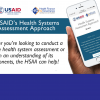
Explore USAID’s Health System Assessment Approach v3.0
Health Systems Assessments, Leads, ToolsUSAID’s Health System Assessment Approach (HSAA) has been widely used in the developing world to diagnose health systems performance and to capture system-wide information to better inform health sector planning. The HSAA looks at the entire health system, including governance, health financing, health services delivery, human resources, pharmaceutical management, and health information systems, plus the […]



